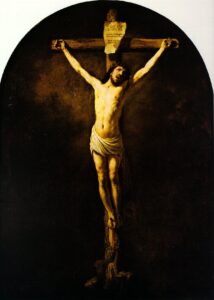
The Cry of Dereliction
And at the ninth hour Jesus cried with a loud voice, “Eloi, Eloi, lema sabachthani?”
which means, “My God, my God, why have you forsaken me?”
Mark 15:34, ESV
Christ on the Cross – Rembrandt, 1631
In his essay, “The Gospel as Tragedy,” Frederick Buechner writes:
“Just as sacramental theology speaks of a doctrine of the Real Presence, maybe it should speak also of a doctrine of the Real Absence because absence can be sacramental, too, a door left open, a chamber of the heart kept ready and waiting.”
What we hear from Jesus in his shout from the cross, often called the Cry of Dereliction, is the Real Absence of God. It seems for a moment that there has been some horrible mistake, that the plan has gone all wrong, because after all, how can God forsake God?
John’s Gospel, in particular, is full of meditations on the unity or oneness of the Father and the Son. Read a few of these statements from Jesus himself:
The glory that you have given me I have given them, so that they may be one, as we are one (17:22).
Truly, truly, I say to you, the Son can do nothing of his own accord, but only what He sees the Father doing. For whatever the Father does, that the Son does likewise (5:19).
My Father, who has given [his sheep] to me, is greater than all, and no one is able to snatch them out of the Father’s hand. I and the Father are one (10:29-30).
So I ask again, how can God forsake God?
It is true that Jesus could have triumphantly leapt down from the Cross and avoided its anguish altogether. It is also true that God Himself could have torn open the heavens to forbid the crucifixion entirely—after all, He Himself saved Isaac; He Himself stayed Abraham’s hand. But neither of these things happens. From the Cross on a Friday afternoon, Jesus cried out that rending lament from Psalm 22: “My God, my God, why have you forsaken me?”
It is in God’s Real Absence that we see his Real Presence in the God-man on the Cross. The Father does not stay his own hand. The Son does not pursue his own will, but the will of the Father. Even at the point of Jesus’s death on the Cross, the Father and the Son are working together for the sake of you, and I, and the rest of the truly Godforsaken.
And if that weren’t enough, Jesus cried out from the Cross in a real voice that has been immortalized for us in the Gospels of Matthew and Mark. His words of forsakenness are from Psalm 22, a Psalm of David, a psalm of anguish. And in reciting this Psalm upon the Cross, Jesus joins voices with all of us who have ever uttered these words in the darkness of despair…as they struggled with thoughts of suicide…as they buried a child…as they committed a heinous sin…as they found themselves utterly without hope.
In joining his voice with ours, Jesus joins his suffering to ours. God in the silence, in the Real Absence, speaking. We do not have a great high priest who cannot sympathize with our weaknesses. We have a great high priest who is really present with us, who has really suffered like us, who has really wept like us, who has really cried out to God like us, and, on a dark Friday afternoon, who has really died like us.
Under His Mercy,
Bree Snow
Minister of Formation and Catechesis

